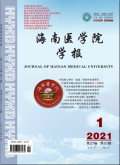海南医学院学报2024,Vol.30Issue(14):1048-1058,11.DOI:10.13210/j.cnki.jhmu.20240408.001
基于PI3K/Akt信号通路探讨肉桂酸保护H2O2诱导H9c2细胞损伤的作用机制
Explore the mechanism of cinnamic acid protecting H2O2-induced H9c2 cell injury based on the PI3K/Akt signaling pathway
摘要
Abstract
Objective:To investigate the protective effect of cinnamic acid on H2O2-induced H9c2 cell injury and its relation-ship with PI3K/Akt signaling pathway.Methods:Predicting the mechanism of chronic heart failure with the help of bioinformat-ics,using H2O2(100 μmol/L)induced cardiomyocyte H9c2 to construct an oxidative stress injury model.The CCK-8 method was used to detect cinnamic acid(1,2,4μmol/L)on H2O2-induced H9c2 cell viability,Hochest33342/PI double staining and flow cy-tometry were used to detect apoptosis.Flow cytometry was used to detect the level of ROS in cells.Colorimetric assay was used to detect the levels of oxidative stress markers SOD,MDA,LDH,GSH,and CAT.The mRNA levels of PI3K,Akt,cas-pase-9,caspase-3,Bax and Bcl-2 were detected by Rt-qPCR.Western blot was used to detect the protein expressions of PI3K,p-PI3K,Akt,p-Akt and caspase-3.After adding LY294002(PI3K inhibitor),the apoptosis rate,ROS,SOD,MDA,LDH,GSH,CAT levels,and the protein expression of PI3K,p-PI3K,Akt,p-Akt and caspase-3 were detected.Results:Bioinformat-ics analysis showed that the occurrence and development of chronic heart failure were mainly related to the PI3K/Akt signaling pathway.In vitro experiments showed that cinnamic acid could significantly increase the viability of cardiomyocytes after H2O2 in-duction(P<0.01),reduce the apoptosis rate and the levels of ROS,MDA and LDH(P<0.01),increased the levels of SOD,GSH,CAT(P<0.01),down-regulated the mRNA levels of caspase-9,caspase-3,Bax and the expression of caspase-3 protein(P<0.05),the mRNA levels of PI3K,Akt and Bcl-2 and the protein expressions of p-PI3K and p-Akt were up-regulated(P<0.05).After adding LY294002,the above effect of cinnamic acid on cardiomyocyte H9c2 was reversed(P<0.05).Conclusion:Cinnamic acid can protect cardiomyocytes by regulating the PI3K/Akt signaling pathway by inhibiting H2O2-induced H9c2 oxida-tive stress damage and apoptosis of cardiomyocytes.关键词
肉桂酸/氧化应激/细胞凋亡/PI3K/Akt信号Key words
Cinnamic acid/Oxidative stress/Apoptosis/PI3K/Akt signaling pathway分类
中医学引用本文复制引用
魏科东,吴婉婉,任涵,赵婉竹,丁芮,陈明,周鹏,王靓,黄金玲..基于PI3K/Akt信号通路探讨肉桂酸保护H2O2诱导H9c2细胞损伤的作用机制[J].海南医学院学报,2024,30(14):1048-1058,11.基金项目
This study was supported by National Natural Science Foundation of China(81973844,81373533)国家自然科学基金项目(81973844,81373533) (81973844,81373533)

